Select Language
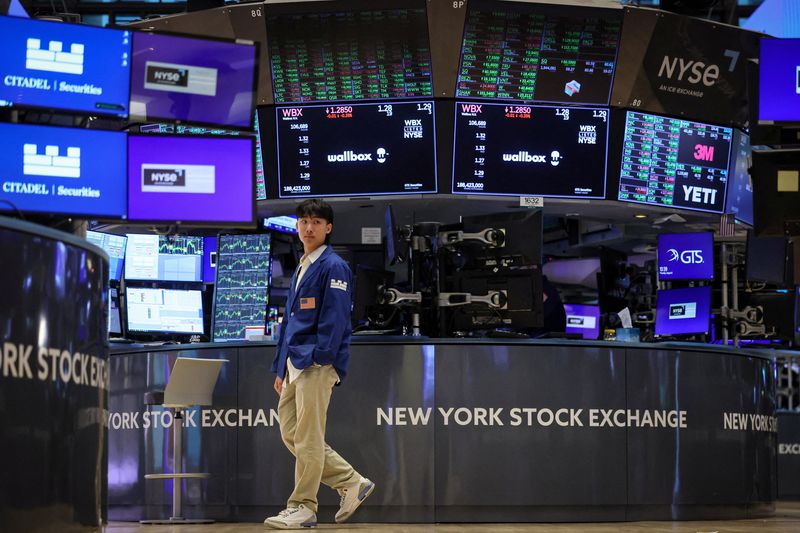
By Noel Randewich
(Reuters) - The S&P 500 will trade near current record levels at year-end, according to a Reuters poll of market strategists that suggests the AI rally is losing steam as investors wait for a widely-expected U.S. central bank interest rate cut next month.
The benchmark S&P 500 will end 2024 at 5,600 points, according to the median forecast of 41 equity strategists, analysts, brokers and portfolio managers collected Aug. 8-20. The index closed at 5,608 on Monday.
In a May poll, market strategists expected the S&P 500 to trade nearly unchanged for the rest of the year but the index has climbed over 5% since then.
Overall, the S&P 500 has surged around 17% so far in 2024, backed by sharp gains in Nvidia (NASDAQ:NVDA), Microsoft (NASDAQ:MSFT) and other Wall Street heavyweights as they race to dominate emerging AI technology.
The U.S. stock market has turned volatile in recent weeks, partly on recession fears, but also related to the unwinding of large leveraged positions in markets as a result of a sudden, sharp rise in the Japanese yen, used as a funding currency.
Fading recession concerns helped boost stocks last week, marking their biggest weekly gains since November.
Investors have also become nervous about massive spending by Google-parent Alphabet (NASDAQ:GOOGL), Microsoft and Meta Platforms (NASDAQ:META) to build their AI infrastructure.
"The AI sugar high is fading and the market is coming to grips with a possible slowdown in GDP," said Synovus (NYSE:SNV) Trust portfolio manager Daniel Morgan, warning as well of "little room for error" due to stretched valuations.
The S&P 500 dipped 0.2% on Tuesday ahead of an annual central banking conference at Jackson Hole, Wyoming later this week that could offer clues about the trajectory of interest rate cuts. The index is down about 1% from its record high close on July 16.
Nvidia's stock has surged 158% in 2024, and analysts expect the chipmaker's quarterly net income to more than double when it reports its results next week, according to LSEG.
The S&P 500 will trade at 5,900 points by the end of next year, a 5.2% gain from Monday's close, the survey showed.
Stock strategists struggle to accurately predict the market, but their forecasts offer a glimpse of sentiment across Wall Street and Reuters poll medians often correctly predict the direction of trading.
A neck-and-neck race between former President Donald Trump and Vice President Kamala Harris means additional uncertainty for investors ahead of the Nov. 5 U.S. presidential election.
As well, turmoil in the Middle East and uncertainty over how many interest rate cuts the Fed will deliver make it particularly difficult right now to forecast the stock market, said Chase Investment Counsel President Peter Tuz.
Money market traders mostly expect a 25 basis point rate cut at the Fed's September policy meeting, with a total of at least 75 basis points in reductions by year end, according to CME Group's (NASDAQ:CME) FedWatch.
Asked by Reuters, over half of poll respondents said a stock market correction of at least 10% is likely by the end of September. More than half predicted corporate earnings would beat expectations through the end of 2024.
While the AI rally has benefited the U.S. stock market's most valuable companies, much of the market has lagged.
The median S&P 500 stock has gained around 9% this year, while the S&P 500 consumer discretionary, real estate and materials sector indexes have languished with year-to-date gains of about 5% each.
Following this year's rally, the S&P 500 is trading at 21 times expected earnings, compared to a 10-year average of 18, according to LSEG.
Goldman Sachs lowered the odds of a U.S. recession in the next 12 months to 20% from 25% following recent upbeat jobless claims and retail sales reports.
(Other stories from the Reuters Q3 global stock markets poll package)
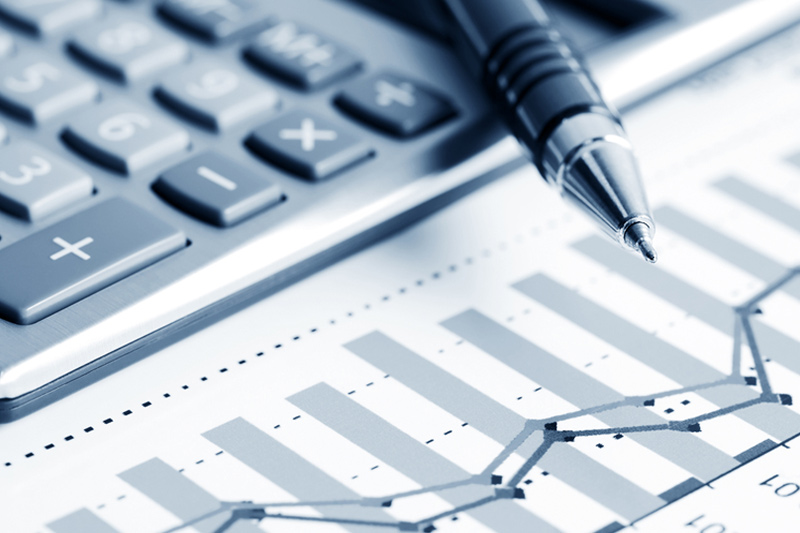
Investing.com -- A luxury yacht carrying a group of individuals, including Morgan Stanley International Chairman Jonathan Bloomer and British tech entrepreneur Mike Lynch, sank off the coast of Sicily early Monday, as per a Reuters report.
The "Bayesian," a luxury yacht owned by Angela Bacares, sank near the Sicilian port of Porticello during a severe storm. Of the 22 people on board, 15 were rescued, including a one-year-old child.
Tragically, one person died, and six, including yacht owner Bacares' husband, British tech entrepreneur Mike Lynch, and Morgan Stanley Chairman Jonathan Bloomer, remain missing. Lynch's 18-year-old daughter is also among the unaccounted for, the report added.
Also reported missing are Chris Morvillo, a lawyer at Clifford Chance, and several others of British, American, and Canadian nationality. Eyewitnesses described the yacht vanishing quickly beneath the waves just before dawn.
The report mentioned that the Italian coast guard confirmed the missing individuals were on a trip organized by Lynch for his work colleagues. The captain of a nearby boat described turning on his engine to avoid colliding with the Bayesian as the storm intensified. After the weather subsided, the yacht was nowhere to be found.

By Veronica Dudei Maia Khongwir
BENGALURU (Reuters) - The Bank of Korea will keep its key interest rate at 3.50% on Thursday and cut it next quarter after the U.S. Federal Reserve likely begins easing in September, according to a Reuters poll.
The benchmark rate has been at 3.50% since January 2023. With inflation rising 2.6% in July from an 11-month low of 2.4% in June, moving further away from the central bank's 2% target, the BOK may need to see prices stabilising before it starts to ease policy.
The Korean won, which has lost over 3% against the dollar this year and is one of the worst-performing emerging market currencies in 2024, was also likely to prevent the BOK from leapfrogging the U.S. Federal Reserve's first rate cut, which is widely expected to come in September.
A strong majority of economists, 38 of 40, in the Aug. 13-19 poll forecast the central bank would keep its base rate unchanged at 3.50% on Aug. 22. The remaining two predicted a 25 basis point cut to 3.25%.
Although two board members said in July they were open to rate cuts, economists cautioned such a move could exacerbate house price increases in Seoul, heightening concerns in a country with one of the world's highest household debt-to-GDP ratios, at 104.3% in the first quarter.
"The BoK will continue to signal a more dovish stance, albeit cautiously, given persistent concerns about rising home prices and the associated financial stability risks," wrote Krystal Tan, economist at ANZ Bank.
"Our base case is still for the BoK to kick off its rate easing cycle in October, following a likely Fed pivot in September. The government is also set to tighten debt service ratio regulations from September, which should help contain growth in household debt."
Median forecasts showed no change to interest rates this quarter but predicted a 25 basis point cut to 3.25% in the October-December quarter. This outlook was largely unchanged from a July survey.
Among economists who provided an outlook until the end of 2024, 27 forecast the rate would be at 3.25%, while eight predicted 3.00%.
"We think the BOK will cut rates in October, with inflation higher than expected there is no urgency... to cut as soon as August. Also, house prices in Korea (are) actually quite high at the moment," said Kelvin Lam, senior economist at Pantheon Macroeconomics.
The BOK has cited growth in household debt and rising home prices as key factors it is monitoring before opening the door to rate cuts. House price increases accelerated in July, with prices in Seoul increasing the most in over four years.
Going into next year, the BOK was expected to cut rates by an additional 75 basis points, bringing its interest rate to 2.50% by the end of 2025, the poll showed.

By Daksh Grover
(Reuters) - Gold held steady near its record high on Tuesday as investors awaited U.S. Federal Reserve minutes and Chair Jerome Powell's speech for indications on how much the central bank will cut rates this year.
Spot gold edged 0.2% higher to $2,500.08 per ounce by 0254 GMT, trading slightly below an all-time high of $2,509.65 hit on Friday. U.S. gold futures rose 0.1% to $2,537.70.
"Gold prices have been largely steady in the Asian session, seemingly catching a breather as buyers seek to defend its new record high," said IG market strategist Yeap Jun Rong.
"The broader upward trend for gold remains intact, which could see prices eye for a move towards the $2,665 level from a technical perspective."
Gold prices have rallied more than 20% so far this year on optimism that the Fed will begin cutting interest rates in September, robust central bank buying and safe-haven demand stemming from the Middle East tensions.
Non-yielding bullion's appeal tends to shine in a low interest rate environment. The Fed is expected to cut rates by 25 basis points at each of the three remaining meetings of 2024, with a slim majority of economists in a Reuters poll dismissing recession concerns.
Trader will closely monitor the minutes of the Fed's July policy meeting on Wednesday and Chair Jerome Powell's speech at the Jackson Hole symposium on Friday for further hints.
The U.S. dollar dipped to a seven-month low in the previous session, lending support to dollar-denominated gold.[USD/] [US/]
Holdings of SPDR Gold Trust (P:GLD), the world's largest gold-backed exchange-traded fund, jumped to their highest in seven months at 859 tonnes on Monday. [GOL/ETF]
Among other metals, spot silver fell 0.8% to $29.25 per ounce. Platinum gained 0.6% to $958.95 and palladium shed 0.8% to $924.75.
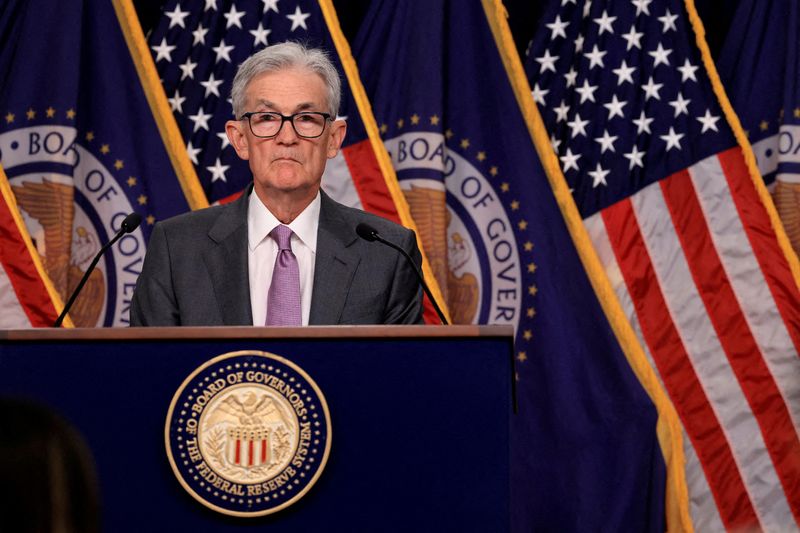
By Howard Schneider
WASHINGTON (Reuters) - Four years after Federal Reserve Chair Jerome Powell made fighting unemployment a bigger priority during the COVID-19 pandemic, he faces a pivotal test of that commitment amid rising joblessness, mounting evidence inflation is under control, and a benchmark interest rate that is still the highest in a quarter of a century.
High interest rates may be on the way out, with the U.S. central bank expected to deliver a first cut at its Sept. 17-18 meeting and Powell potentially providing more information about the approach to the policy easing in a speech on Friday at the Kansas City Fed's annual conference in Jackson Hole, Wyoming.
But with the Fed's policy rate in the 5.25%-5.50% range for more than a year, the impact of relatively high borrowing costs on the economy may still be building and could take time to unwind even if the central bank starts cutting - a dynamic that could put hopes for a "soft landing" of controlled inflation alongside continued low unemployment at risk.
"Powell says the labor market is normalizing," with wage growth easing, job openings still healthy, and unemployment around what policymakers see as consistent with inflation at the central bank's 2% target, former Chicago Fed President Charles Evans said. "That would be great if that is all there is. The history is not good."
Indeed, increases in the unemployment rate like those seen in recent months are typically followed by more.
"That does not seem the situation now. But you may only be one or two poor employment reports away" from needing aggressive rate cuts to counter rising joblessness, Evans said. "The longer you wait, the actual adjustment becomes harder to make."
INFLATION VERSUS EMPLOYMENT
Evans was a key voice in reframing the Fed's policy approach, unveiled by Powell at Jackson Hole in August 2020 as the pandemic was raging, policymakers were gathering via video feed, and the unemployment rate was 8.4%, down from 14.8% that April.
In that context the Fed's shift seemed logical, changing a long-standing bias towards heading off inflation at the expense of what policymakers came to view as an unnecessary cost to the job market.
Standard monetary policymaking saw inflation and unemployment inextricably and inversely linked: Unemployment below a certain point stoked wages and prices; weak inflation signaled a moribund job market. Officials began to rethink that connection after the 2007-2009 recession, concluding they needn't treat low unemployment as an inflation risk in itself.
As a matter of equity for those at the job market's margins, and to achieve the best outcomes overall, the new strategy said Fed policy would "be informed by assessments of the shortfalls of employment from its maximum level."
"This change may appear subtle," Powell said in his 2020 speech to the conference. "But it reflects our view that a robust job market can be sustained without causing an outbreak of inflation."
A pandemic-driven inflation surge and dramatic employment recovery made that change seem irrelevant: The Fed had to raise rates to tame inflation, and until recently the pace of price increases had slowed without much apparent damage to the job market. The unemployment rate through April had been below 4% for more than two years, an unparalleled streak not seen since the 1960s. The unemployment rate since 1948 has averaged 5.7%.
But the events of the last two years, and a coming Fed strategy review, have also triggered a wave of research into exactly what happened: why inflation fell, what role policy played in that, and how things might be done differently if inflation risks rise again.
While the agenda for this year's conference remains under wraps, the broad theme focuses on how monetary policy influences the economy. That bears on how officials may evaluate future choices and tradeoffs and the wisdom of tactics like preempting inflation before it starts.
Some of that work is already emerging from Fed researchers, including top economist Michael Kiley. He has authored a paper questioning whether policy "asymmetry" - treating employment shortfalls differently than a tight labor market, for example - really helps. Another recent paper suggested policymakers who believe public inflation expectations are formed in the short-run and are volatile should react sooner and raise rates higher in response.
The role public expectations play in driving inflation - and the policy response - was on full display in 2022. When it appeared expectations risked moving higher, the Fed pushed its tightening cycle into overdrive with 75-basis-point hikes at four consecutive meetings. Powell then used a truncated Jackson Hole speech to emphasize his commitment to fight inflation - a stark shift from his jobs-first commentary two years earlier.
It was a key moment that put the U.S. central bank's seriousness on display, underpinned its credibility with the public and markets, and rebuilt some of the standing that preemptive policies had lost.
'TOO TIGHT'
Powell now faces a test in the other direction. Inflation is progressing back to 2%, but the unemployment rate has risen to 4.3%, up eight-tenths of a percentage point from July 2023.
There's debate over what that really says about the labor market versus rising labor supply, a positive thing if new job seekers find employment.
But it did breach a rule-of-thumb recession indicator, and while that has been downplayed given other indicators of a growing economy, it also is slightly above the 4.2% that Fed officials regard as representing full employment.
It's also higher than at any point in Powell's pre-pandemic months as Fed chief: It was 4.1% and falling when he took over in February 2018.
The "shortfall" in employment that he promised to respond to four years ago, in other words, may already be taking shape.
While Powell will be reluctant to ever declare victory over inflation for fear of touching off exuberant overreaction, Ed Al-Hussainy, senior global rates strategist at Columbia Threadneedle Investments, said it was past time for the Fed to get in front of the risk to unemployment - preemption of a different sort.
Al-Hussainy said the Fed had proved its ability to keep public expectations about inflation in check, an important asset, but that "also has put in motion some downside risk to employment."
"The policy stance today is offside – it is too tight – and that warrants acting on."

By Michael S. Derby
NEW YORK (Reuters) - U.S. workers are growing more sour with their employment compensation, according to a survey released on Monday by the New York Federal Reserve.
In its Survey of Consumer Expectations Labor Market Survey for July, the regional Fed bank said that as of last month, "satisfaction with wage compensation as well as with non-wage benefits and promotion opportunities at respondents' current jobs all deteriorated."
As of July, 56.7% of respondents said they were satisfied with their pay compared to 59.9% who held the similar view in July 2023. Benefits satisfaction dropped to 56.3% from 64.9% over the same time period, while satisfaction over future career path improvement ebbed to 44.2% of those polled, from 53.5% in July 2023.
The survey noted that the declines in satisfaction were concentrated among women, those without college degrees and those who earned under $60,000 per year.
The survey found a small increase in those who plan to move to new jobs, with 11.6% of respondents saying in January they planned to find a new employer, versus 10.6% who felt likewise in July 2023.
A series high 4.4% of respondents said they expected to lose their job, versus 3.9% in the survey a year ago, even as a rising number of respondents expecting to get at least one job offer in the next four months rose.
The report also weighed in on the state of workers' so-called reservation wage, which is what prospective new hires say they would need to consider taking a job. That wage has been increasing by leaps and bounds in recent years, amid tight labor markets and high levels of inflation.

By Ethan Wang and Ryan Woo
BEIJING (Reuters) - A Chinese mother went on television to seek justice for her 19-year-old intellectually disabled son after scammers tricked the desperate jobseeker into having breast augmentation surgery, in an incident that has sparked widespread outrage.
The teenager hoping for a job at a cosmetic surgery clinic in the central city of Wuhan was told the procedure would help him earn money, by winning followers through livestreaming.
The clinic even convinced him to borrow 30,000 yuan ($4,180) to pay for the surgery, his mother told a television station last week.
"For the sake of money, one can give up one's humanity," said one of more than 2,600 comments on China's Weibo (NASDAQ:WB) social media platform where posts on the boy's plight have drawn more than 27 million views.
"Worse than beasts!" said another.
The mother managed to get the loan cancelled, with the help of the TV station and lawyers, but the breast surgery had already been done.
Scams such as recruitment for non-existent jobs, false advertising and loan traps are growing in China as the economy falters, with the top legal prosecuting agency saying last year that crooks were targeting more students and fresh graduates.
A record 11.79 million students graduated this summer, as the world's second-largest economy grapples with one crisis after another, from a trade war and the aftermath of COVID-19 to a prolonged property crisis and cautious consumer spending.
A job crisis among the young could test the economic leadership of the ruling Communist Party, which has repeatedly urged people to "listen to the party".
Finding jobs for young people is a top priority, President Xi Jinping said this year, as he expressed concern about their employment prospects.
FALSE PROMISES
Youth unemployment hit a record high of 21.3% in June last year, prompting China to halt publication of the closely watched benchmark, saying students still enrolled should be excluded.
There is no way to track all job seekers among those aged 16 to 24, but a spokesperson for the National Bureau of Statistics said last year that 33 million of them were seeking employment.
"The pressure on employment still exists," Liu Aihua, a spokesperson for the statistics bureau, told a press conference on Thursday, after data showed China's overall jobless rate rose to a four-month high in July.
"Key groups still face pressure (in finding work)."
In another scam that made headlines last month, a college student seeking a part-time job in food delivery was persuaded to sign a year-long contract to rent an electric bicycle.
A staffer at a bike rental shop who pretended to be a recruiter for popular food delivery service Meituan told the student that he had to rent a bike before starting the job.
A few weeks later, the student realised his earnings were far below the "tens of thousands" promised by the "recruiter" and he was barely able to scrape together the monthly rental.
"It's hard enough to find a job, and now we need to be careful about scams too," said one Weibo poster.
Authorities say the darkening outlook for jobs has prompted some students to become scammers themselves.
The first 10 months of 2023 saw an annual rise of 68% in the number of those younger than 18 who were prosecuted for phone and internet scams, the prosecuting agency said last November.
The incidents of young graduates with advanced college degrees joining scam syndicates also increased, it added in a report.
The Wuhan teenager's trauma was worsened by having to go under the knife a second time to remove the breast implants, his mother said on television.
"It pains me to see the two scars under my son's chest," she added.
($1=7.1735 Chinese yuan renminbi)
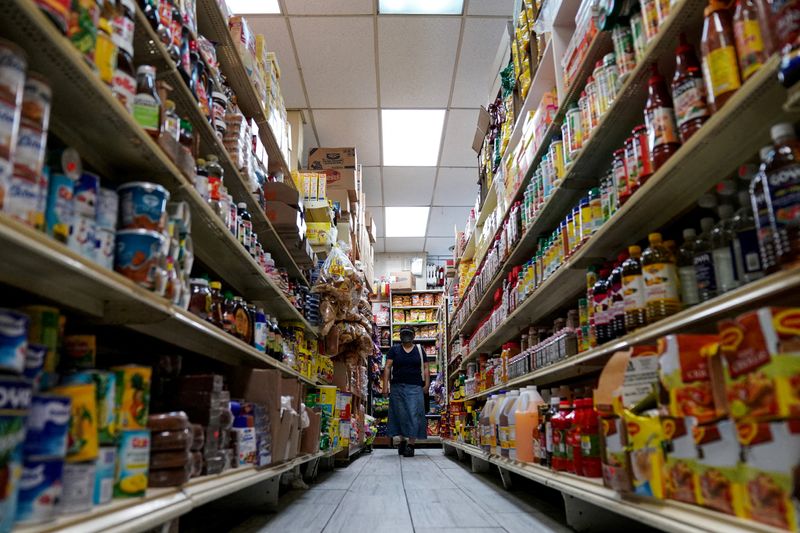
(Reuters) - Goldman Sachs has lowered the odds of the United States slipping into a recession in the next 12 months to 20% from 25% following the latest weekly jobless claims and retail sales reports.
Earlier this month, the brokerage raised the odds of a U.S. recession from 15% after the unemployment rate jumped to a three-year high in July, sparking fears of a downturn.
"We have now shaved our probability from 25% to 20%, mainly because the data for July and early August released since August 2 shows no sign of recession," Goldman Sachs chief U.S. economist Jan Hatzius said in a note on Saturday.
"Continued expansion would make the U.S. look more similar to other G10 economies, where the Sahm rule has held less than 70% of the time," he added.
Thursday's jobless claims report showed number of Americans filing for unemployment benefits dropped to a one-month low in the previous week, while separate data revealed on the day that retail sales increased by the most in 1-1/2 years in July.
Hatzius said if the August jobs report seems "reasonably good", he would cut back the U.S. recession probability to 15%.
He maintains the Federal Reserve will cut interest rates by 25 basis points at its September meeting, but did not rule out a 50 bps cut if the jobs report falls short of expectations.
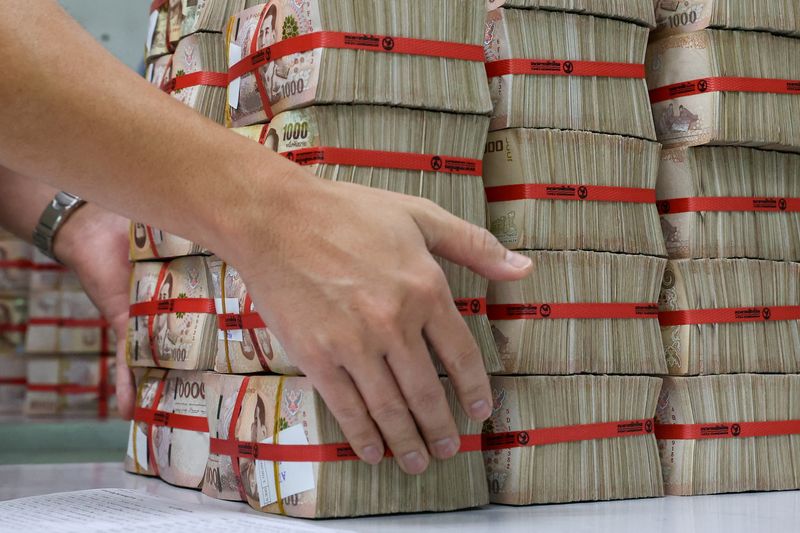
By Pranoy Krishna
BENGALURU (Reuters) - The Bank of Thailand (BOT) will keep interest rates unchanged on Wednesday and through Q1 2025 to balance growth with inflation control while assessing the impact of ongoing political instability on the economy, a Reuters poll found.
While inflation, at 0.83% in July, remained below the BOT's target range of 1%-3%, Governor Sethaput Suthiwartnarueput said the current interest rate is appropriate and there is no need to cut despite the government's repeated calls to lower it.
With growing political uncertainty following the dismissal of Thai Prime Minister Srettha Thavisin, the BOT - previously bickering with Srettha's government over the scale of cash handouts to tackle high household debt - will remain in a wait-and-watch mode to assess the impact on the economy.
Thailand's parliament elected Paetongtarn Shinawatra as its youngest prime minister on Friday, daughter of divisive political heavyweight Thaksin Shinawatra.
All but three of the 27 economists in the Aug. 8-16 Reuters poll expected the BOT to keep its benchmark one-day repurchase rate unchanged at 2.50% on Aug. 21.
Three economists predicted a 25 basis point cut.
"We are not anticipating any policy rate changes. A lot will depend on the growth outlook. If political calm prevails ... the BOT is likely to keep its policy rate on hold through 2024, before modest rate cuts in mid-2025 when growth is likely to slow," wrote Khoon Goh, head of Asia research at ANZ.
"However, intensifying political risks in the coming weeks and disruptions in fiscal policy implementation would strengthen the case for a recalibration in monetary policy settings sooner rather than later."
Still, a weak Thai baht, which is down about 2% against the U.S. dollar so far this year, suggests any move before the U.S. Federal Reserve's expected policy easing in September will likely be inflationary.
"We do not expect the BOT to ease aggressively or make a preemptive rate cut ahead of the U.S. Federal Reserve. By easing along with the Fed, the BOT can avoid putting additional downward pressure on the baht," wrote Eugene Tan, associate economist at Moody's (NYSE:MCO) Analytics.
Median forecasts showed interest rates will remain steady at 2.50% through the first quarter of 2025 before a 25 basis-point cut to 2.25% in Q2, whereas a July survey had predicted the first cut would occur in the first three months of 2025.
A much smaller sample of economists who provided forecasts until end 2025 expected rates to decrease by 50 basis points to 2.00%.
However, a few economists in the poll said the ongoing political upheaval is likely to pose significant risks to that outlook, and that policy easing could occur sooner than anticipated.
"The central bank really doesn't have much reason to adjust its policy stance. However, given the situation we will monitor risks to that call ... especially if political uncertainty prolongs and the policy continuity that we expect does not materialize," said Lavanya Venkateswaran, senior ASEAN economist at OCBC.
Venkateswaran expects no change in rates until end-2025.
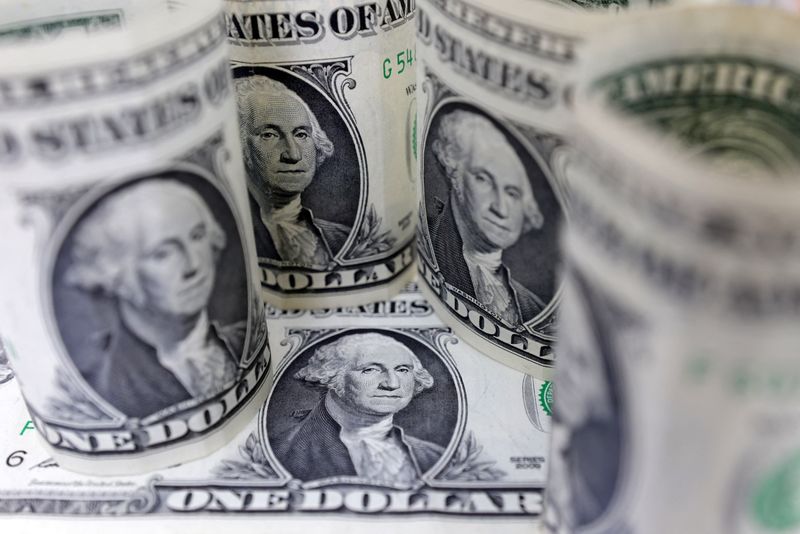
By Rae Wee
SINGAPORE (Reuters) - The U.S. dollar was struggling to make headway against its peers on Monday, though it traded in a tight range as investors awaited fresh catalysts this week that could offer clues on the outlook for U.S. interest rates.
Minutes of the Federal Reserve's July policy meeting and a speech from Chair Jerome Powell at Jackson Hole are likely to be the main drivers of currency movement this week, which will also see inflation data from Canada and Japan alongside Purchasing Managers' Index readings across the U.S., euro zone and UK.
The euro last bought $1.1026 while sterling rose to a one-month high of $1.2950 in an otherwise muted start to the Asian trading session, as bets for an imminent start to the Fed's easing cycle pressured the dollar.
Against a basket of currencies, the greenback fell 0.06% to 102.40.
Traders have fully priced in a 25-basis-point rate cut in September, with a 24.5% chance of a 50 bp move. Futures point to over 90 bps worth of easing by year-end.
"Markets will be laser focused to what Powell has to say at the end of this week, and on that, I think it will be a great opportunity for Powell to either endorse or push back market pricing," said currency strategist Carol Kong at Commonwealth Bank of Australia (OTC:CMWAY) (CBA).
"I think he'll at least greenlight a rate cut at the September meeting. If anything, I think he'll try to retain optionality because we do have some more data before the next meeting."
CFinancial markets had a turbulent start to August after a slew of softer-than-expected U.S. economic data - in particular, a weak jobs report for July triggered severe volatility as investors feared the world's largest economy was headed for a recession and that the Fed was being slow in easing rates.
With those worries now moderating, traditional safe haven assets such as the yen - which received a boost from a flight to safety - have given up some of their early August gains.
The Japanese currency was last 0.2% lower at 147.93 a dollar, having fallen some 4% from a seven-month high at the start of the month.
Japanese investment data on Friday confirmed that after a bout of turmoil, investors were back to betting on the Bank of Japan going slow on rate rises and on the yen staying cheap.
"Given financial markets have calmed down and volatility has eased, I think it is possible that dollar/yen can recover more, perhaps to 150, as volatility continues to move back lower," said CBA's Kong.
The New Zealand dollar rose 0.16% to $0.6062, while the Australian dollar hit a one-month high of $0.66865.
The Aussie has been drawing support from a still-hawkish Reserve Bank of Australia after Governor Michele Bullock on Friday said it was premature to be thinking about rate cuts.
Her comments came just days after the Reserve Bank of New Zealand delivered its first rate cut in over four years.

